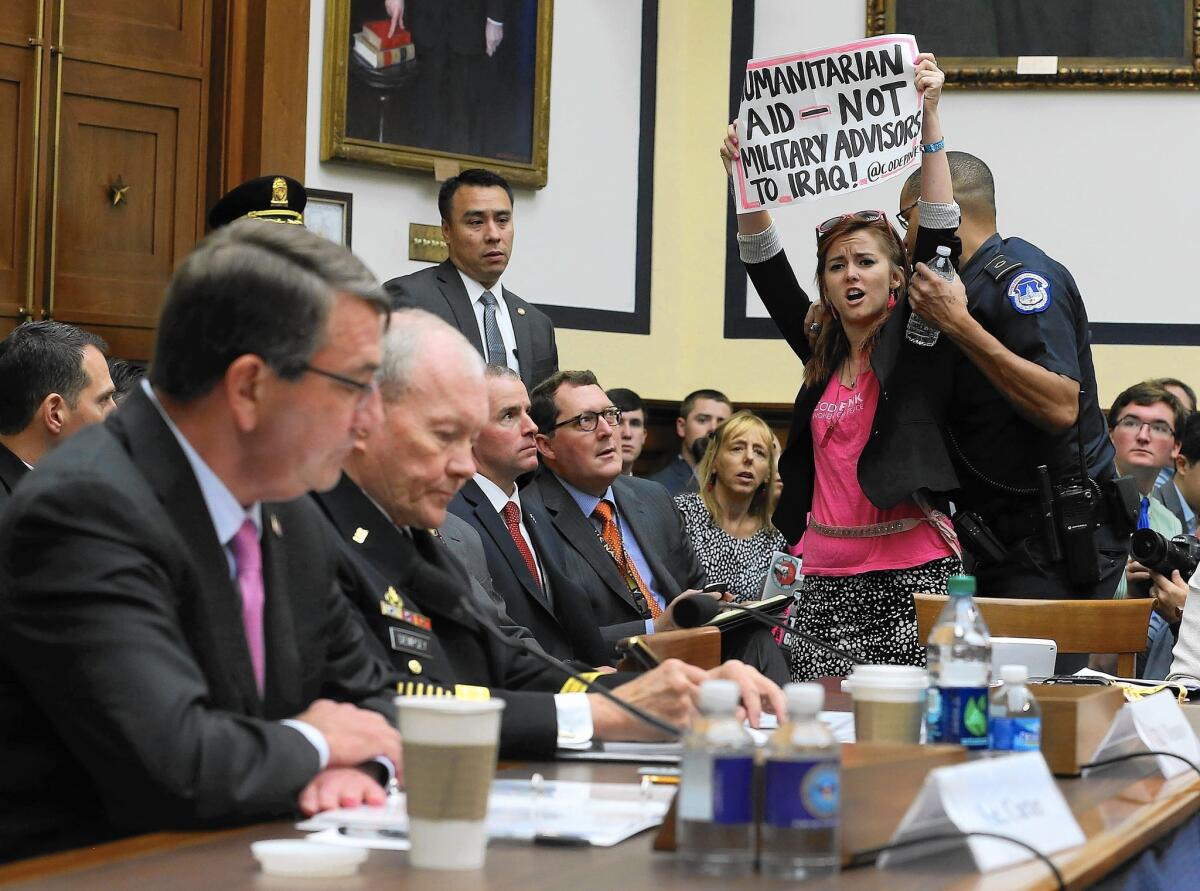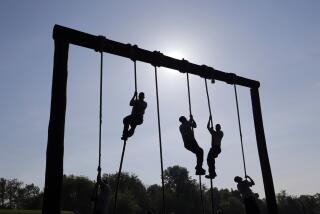Program to train Iraq troops lacks recruits, U.S. says

- Share via
Reporting from Washington — A U.S.-led military training program in Iraq has turned out only 7,000 Iraqi soldiers since last year, far short of the 24,000 that the Pentagon envisioned training by this fall, senior U.S. officials acknowledged Wednesday, the latest sign of trouble in the campaign against Islamic State.
“We simply haven’t received enough recruits” from the Iraqi government, Defense Secretary Ashton Carter told a House Armed Services Committee hearing. “We must see a greater commitment from all parts of the Iraqi government.”
Despite the shortfall, Carter said he fully supported the White House decision last week to open a fifth training camp at Taqaddum military base in eastern Anbar province and to send 450 additional U.S. military trainers and support personnel there.
Iraqi Prime Minister Haider Abadi’s government criticized Carter last month after he warned that Iraqi troops won’t be able to defeat Islamic State unless they develop a “will to fight.”
His comments reflected growing concern and frustration in the Obama administration after Iraqi military forces abandoned Ramadi, Anbar’s capital, to a much smaller group of Islamic State fighters.
Carter used more diplomatic language Wednesday. “What we saw in Ramadi last month was deeply disappointing and illustrated the importance of a capable and motivated Iraqi ground force,” he said.
He said the White House and Pentagon agreed, after the setback in Ramadi, to enhance the U.S. training program for Iraqi troops and especially to “reinvigorate and expedite the recruitment of Sunni fighters,” including local tribal fighters, to ease the sectarian divide.
The U.S. training at Taqaddum can help draw Sunni Muslims to join the Shiite Muslim-dominated army, a necessary step if Iraq’s forces are to retake Sunni majority cities, such as nearby Ramadi and Fallouja, Carter said.
U.S. strategy “hinges on Sunni fighters, that’s the essential ingredient,” he said.
Carter and Gen. Martin Dempsey, chairman of the Joint Chiefs of Staff, faced skeptical questioning from lawmakers from both parties. Several said they doubt Sunnis would fight for a government that has relied heavily on Shiite militias and Iranian advisors to fight the Sunni extremists in Islamic State.
“I hope we have thousands of Sunnis who flood into this training, but there are concerns about whether they are going to do that and trust the Iraqi government,” said Rep. Mac Thornberry (R-Texas), the committee chairman.
Republicans called for the administration to provide more direct assistance to Iraq, including U.S. troops to accompany Iraqi units into battle as advisors, and to call in coalition airstrikes.
Democrats on the panel generally warned against deeper U.S. involvement, even questioning in some cases the decision to send more trainers.
Carter said the administration would “revisit” whether to send more U.S. troops, or to broaden their role, once “adequate” Iraqi units are in combat.
Dempsey said the Pentagon might recommend adding troops and even a limited ground combat role once Iraq shows it is ready to undertake military operations to oust the militants from major cities, such as Mosul in the north.
But he emphasized that he agreed with the White House strategy of limiting the U.S. role and relying on Iraqi troops and Kurdish forces in the north for ground combat operations.
“I would not recommend putting U.S. forces in harm’s way simply to stiffen the spine of local forces,” he said.
Twitter: @DavidCloudLAT
More to Read
Sign up for Essential California
The most important California stories and recommendations in your inbox every morning.
You may occasionally receive promotional content from the Los Angeles Times.












